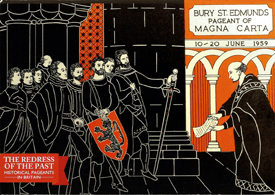- Home
- About Us
- The Great Charter
of Bury St Edmunds - The Magna Carta
- The Pageants
- Events
- Past Events
- Resources and Links
- Photo Gallery
- Rebecca’s Magna Carta Blog
Pageants Exhibition at Moyse’s Hall 4 May to 28 August 2015 FREE

Rebecca’s Magna Carta Blog Part 5
The Marshal Family
I hope you all saw the BBC programme ‘The Greatest Knight; William the Marshal’ that aired back in April. If you didn’t it is worth trying to find it somewhere. It outlines the story of William Marshal, a man who started life as a fourth son of a minor nobleman with no inheritance and rose to become one of the most important and influential men in the kingdom. One quality that saw him rise so high was his loyalty, although the same cannot be said of other members of his family.
William Marshal’s father John (c1105-1165) was royal marshal to King Henry I from 1130. When Henry I died John swore an oath to King Stephen, but in 1139 John changed sides and swore an oath to Empress Matilda. In 1152 this almost cost him the life of his five year old son, William, who was being held hostage by Stephen whilst he besieged John in Newbury Castle. Fortunately, Stephen could not bring himself to harm the boy who then grew up to become William Marshal, 1st Earl of Pembroke and one of the most powerful men in the kingdom.
William Marshal the Younger (c1190-1231) was the son and heir of William Marshal, Earl of Pembroke (1147-1219). He spent five years as a royal hostage, from 1205-1212. William Marshal the younger was one of the surety barons for Magna Carta. In the Barons’ War of 1215-17, William Marshal the Younger fought in several battles on the side of the rebels, though he took care never to fight against his father. He then fell out with Prince Louis of France, who had been invited by the barons to be king instead of John. He rejoined the royalist army, commanded by his father. In 1217, the Marshals fought together in the Battle of Lincoln, the royalist victory which ended the war.
William Marshal the elder had an interesting career after avoiding death aged five. He was trained as a knight in the household of William de Tancarville, a relative of his mother and then served in the household of Patrick, Earl of Salisbury, his uncle. In 1168 he was captured in an ambush and later ransomed by Eleanor of Aquitaine. He then made a name for himself on the tourney circuits, on his deathbed it was claimed he had bested 500 knights during his tourney career. He then served a further four/five kings, including Richard I who he had unseated from his horse only a week or so before he became king in the defence of King Henry II. Under Richard I, William was part of the regency council while Richard led the Third Crusade. When King Richard died he made William the custodian of Rouen and the royal treasury until the new king was appointed and acknowledged. He supported John’s claim to the throne over that of Prince Arthur. William’s involvement in the Magna Carta story is significant. He remained loyal to King John throughout the troubles, despite his personal difficulties with John earlier in his reign. Upon the death of King John, he was made responsible for overseeing the royal funeral and became regent for Henry III. He reissued Magna Carta as part of his plan for getting the rebel barons to support the young king, both before and after the peace of 1217.
As well as his son being one of the rebel barons in 1215-1217 two of his daughters were married to other rebels. William Marshal’s daughter Maud was married to Hugh Bigod & his daughter Isabel was married to Gilbert de Clare. In 1242 his son Walter married the widow of John de Lacy, another Magna Carta baron, Margaret de Quincy, who was also the granddaughter of Saer de Quincy, also a Magna Carta baron. His daughter Eva married William de Braose, the grandson of William de Braose, whose wife and eldest son died whilst in the custody of King John, their treatment had been one of the things that led to Magna Carta and is something I will look at in a later post. Whilst this intermarriage between noble families was common for the period, these particular connections could suggest a certain amount of sympathy and loyalty to the cause of the rebels although William Marshal the elder remained loyal to the crown.
You can read more about the stories of the Marshal family in the historical novels A Place Beyond Courage, The Greatest Knight, The Scarlet Lion and To Defy a King by Elizabeth Chadwick.